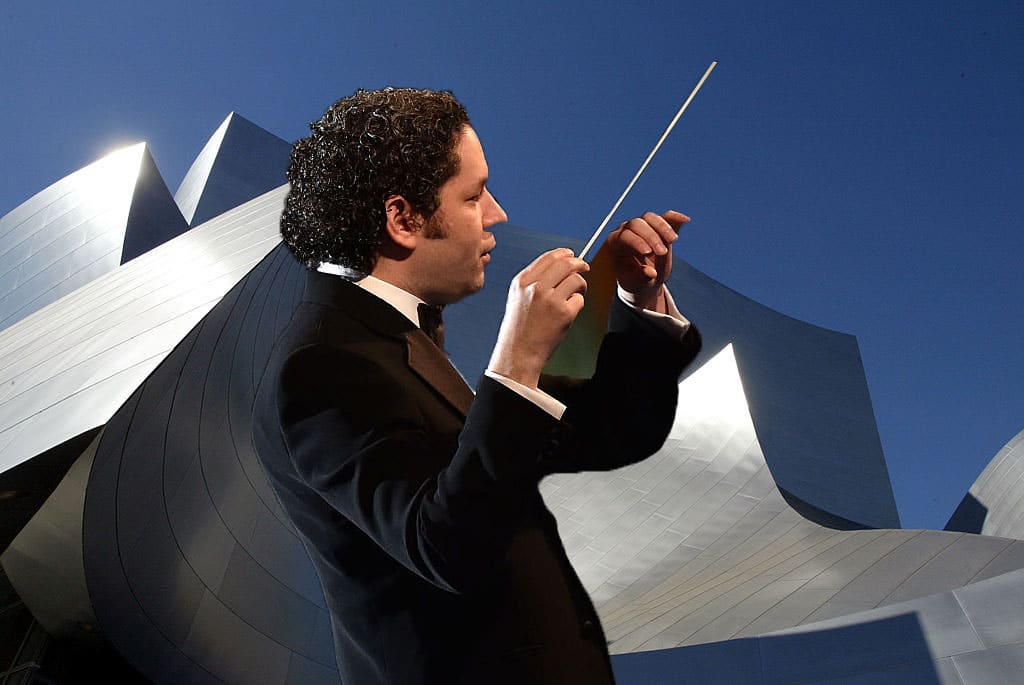 Walt Disney Concert Hall (Photo by David McNew/Getty Images); Gustavo Dudamel (Photo by Mike Windle/Getty Images for Turner)
Walt Disney Concert Hall (Photo by David McNew/Getty Images); Gustavo Dudamel (Photo by Mike Windle/Getty Images for Turner)
“I am not a young conductor anymore,”
declared Gustavo Dudamel. “Downtime” I bless and reconstruct.
We all compose the earlier movements of our lives
before the last one, often a surprise, arrives,
enabling us to celebrate the others we were able to conduct.
Downtime’s a temporal downtown in which we explore
past times that we cannot restore,
downtime a neometaphor
for all the time we built before
the time arrives when anymore is
like Beethoven’s most joyful chorus,
conducted in downtime’s downtown,
life’s finally creative crown,
by ourselves awarded to
ourselves, and hopefully by you,
blessing God, for downtimes that are new,
transformed when old to new with she’heheyanu.
This is the she’hehyanu blessing:
בָּרוּךְ אַתָּה ה’ אֱלֹהֵינוּ מֶלֶךְ הָעוֹלָם,
שֶׁהֶחֱיָנוּ וְקִיְּמָנוּ וְהִגִּיעָנוּ לַזְּמַן[1] הַזֶּה.
Blessed are You, the Lord who is our God, Sovereign of the universe, who preserved our lives, and sustained us and enabled us to reach this season.
In “Gustavo Dudamel: A Maestro at a Crossroads: “I’m not a young conductor anymore,” Dudamel said as he prepares to leave Los Angeles in 2026 to lead the New York Philharmonic,” NYT, Feb. 12, 2023, Javier C. Hernández writes:
Gustavo Dudamel paused mid-Rachmaninoff the other morning and flashed a mischievous smile at the 92 players of the Los Angeles Philharmonic.
“This part,” he said as they rehearsed at Walt Disney Concert Hall, “is like that aunt who kisses you too much.” He puckered his lips loudly three times. “My dears,” he said, looking toward the violins, “let’s try it again.”
He was back on the same podium where, just two days earlier, he had broken the news to the musicians, in a shaky and uncertain voice, that he would leave his post as their music and artistic director in 2026 to take on the same job at the New York Philharmonic. It was, he said, one of the hardest decisions of his life. But now he was back in his element, making music, swaying his hips and throwing his fist into the air, and imploring the players to “liberate every bit of gravity” from their playing — “to levitate.”
Dudamel, 42, the rare maestro whose fame transcends classical music, finds himself at a crossroads: not only planning to move to a new orchestra, but also into a new phase of his career. Even as his curls have started to gray, he has never quite shed the image of a wunderkind, who at the age of 12 led his first orchestra in Venezuela, where he was born, and at 26 landed the job in Los Angeles.
Gustavo Dudamel checks his tie in the mirror, holding his baton in his left hand, in a backstage area with video monitors and wooden cases.
“You cannot imagine how I have changed in these last years,” he said in an interview. “I’m not a young conductor anymore.”
Gershon Hepner is a poet who has written over 25,000 poems on subjects ranging from music to literature, politics to Torah. He grew up in England and moved to Los Angeles in 1976. Using his varied interests and experiences, he has authored dozens of papers in medical and academic journals, and authored “Legal Friction: Law, Narrative, and Identity Politics in Biblical Israel.” He can be reached at gershonhepner@gmail.com.























 More news and opinions than at a Shabbat dinner, right in your inbox.
More news and opinions than at a Shabbat dinner, right in your inbox.